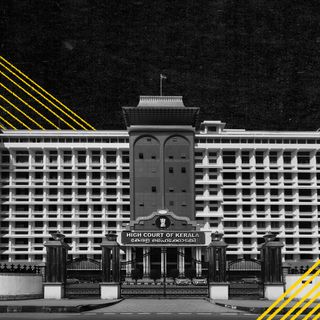The sealing of the Ganga Jamuna red light area in Nagpur last week has triggered protests by sex work organizations and civic groups. The residents, more than 1,200 sex workers, note the closure hampers their trade and impinges on fundamental rights.
This red light area is three centuries old. It was barricaded last week over concerns of the “illegal sex trade.” The concern voiced by locals is of trafficking minor girls, and soliciting in public places is also a violation of the law. “Also, we have witnessed a very heavy footfall of customers in the locality after the second Covid wave. All this led to the decision to shut the area,” the Nagpur commissioner of police told the Indian Express.
The police closed the area citing the Immoral Traffic (Prevention) Act, and the government welfare board is in favor of rehabilitating the workers, removing them from the district. The police also passed Section 144 of the Code of Criminal Procedure (CrPC) prohibiting the assembly of four or more people on August 12th, but activists note the order was passed after mobility was restricted. “No announcement was made, nor was there any hint that such a dire restriction of mobility was intended,” anti-human trafficking organization National Network of Sex Workers (NNSW) wrote in a petition.
The contention of sex worker unions is twofold: the implementation of barricading was abrupt and without due discussion; and the sealing in itself affects the source of livelihood, hinders access to healthcare, and also stigmatizes sex work that already bears the weight of social stigma. The closure has since sparked an “UnsealGangaJamuna” movement.
“…the order appears to have been issued to cover up dictatorial orders of cordoning off the locality, thereby putting all sex workers with their children and families in an illegal prison,” NNSW noted in a petition.
Cordoning off the entire area in the name of scuttling illegal activities, violates residents’ rights by restricting their access to food and medicines.
“Those demanding the closure of the brothel live in big bungalows and don’t have to bother about two square meals. Here, these women and their children are confronted with a situation where they have nothing to eat. Why should they be pushed into starvation?” Jwala Dhote, president of Vidarbha Anyay Nivaran Samiti, told the Indian Express.
Related on The Swaddle:
New Anti‑Trafficking Bill Fails to Address Sex Workers’ Concerns, Activists Say
Sex work is recognized by international bodies as well as the Union Government of India. Court orders over the last year also noted sex workers must get an adequate supply of ration and resources during the lockdown.
However, the tussle between sex workers and local welfare boards is telling of the censure and disregard the profession faces. Activists point out the objections to the red light area highlight how sex work is conflated with human trafficking, criminalizing the former in the process. This understanding was also on display in the newly floated Anti-Trafficking Bill. Activists noted the draft Bill criminalizes sex work, leaves workers more vulnerable to law enforcement measures, and enables exploitation due to lacking safety nets and labor rights.
“Sex work is different from trafficking and it is a form of self-employment that is stigmatized… We are often arrested even without a client present,” Nalini Jameela, a former sex worker told The Hindu this year.
The idea of “rescuing” sex workers is, then, detrimental to the workers. Almost 77% of the women who were purportedly rescued returned to sex work due to being pushed into a more vulnerable position, according to a 2018 research.
“For years, sex workers have highlighted the continued attempt by abolitionists to forcibly raid and rescue them and incarcerate them in rescue and rehabilitation homes against their wishes. These organizations have used the current anti-trafficking laws to incarcerate adult women in sex work for long periods of time in rescue homes,” the NNSW noted.
The illegal closure in Ganga Jamuna, and other parts, further alienate sex workers from claiming entitlements and distances people from integration into the labor force. “Organizing as informal sector workers gives them the much-needed recognition, dignity, and space to claim rights, access government support, and access justice when faced with violence,” the petitioners noted.
What’s at stake is the dignity and rights of thousands of workers, whose narratives are appropriated and erased.




